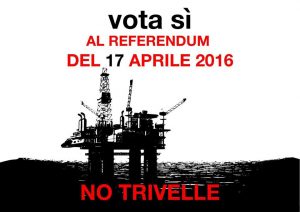La Politica. Politics in Italy loom large. As guests we prefer to focus on the spectacular scenery, inspirational art and mouthwatering food. We laugh at the political machinations and exaggerated personalities that make a splash in the headlines, as we do in our own country; however, la politica is serious business and I’d like to reflect for a moment on Italy’s referendum this past weekend.
First things first. Italian politics are extremely confusing. Political parties come and go, names change and acronyms are the preferred handles. Outsiders have to pay close attention to the written word as without a solid understanding of the parties and issues, the political talk shows, which abound, can be difficult to decipher with pundits and politicians talking over each other, often ending up in shouting matches. It’s larger than life, colorful stuff that all too often doesn’t have the people’s interests at heart.
NO COASTAL DRILLING
The referendum this past weekend was proposed by nine regions: Basilicata, Marche, Puglia, Sardegna, Veneto, Calabria, Liguria, Campania and Molise. The basic premise was to safeguard Italy’s shores from drilling within twelve miles of the coastline by holding the oil and gas companies to the expiration dates of the original licensing periods. Thus, instead of extending the agreements, the companies would have to pack up their bags and dismantle the rigs regardless of the amount of hydrocarbon left to exploit as their thirty-year contracts expire over the next eighteen years. Of the 135 platforms and wellheads in Italian waters, 92 fall within the twelve-mile range.
Let’s face it, Italy is known for its beautiful coastlines. However, the extraction platforms are not only eyesores, they pollute. The region that has had the greatest coverage in this regard of late is Basilicata, nestled between Calabria and Apulia in the instep of the Italian boot. Despite governmental claims that oil and gas extraction brings wealth, after thirty years of drilling in the region, it is the poorest and suffers from the highest level of cancer in the country.
Add to all of this the fact that Italy’s offshore oil and gas count for less than 4% of the nation’s consumption. In addition, the royalties collected in Italy from offshore drilling are amongst the lowest in the world, with a yearly total amounting to the equivalent the government spent to hold this separate referendum on the subject, rather than to have the vote alongside a regular election. And then there are the platforms that aren’t subject to any royalties as they don’t reach the minimum production level – that would be more than half of them, old, risky structures not obliged to be dismantled.
WHEN YES MEANS NO

Vote Yes in the referendum – No Rigs
Clearly, I was convinced by the issues, but what about the Italian people? Well, this is where things got a little confusing. If a citizen wanted to vote against drilling, he or she had to vote yes in the ballot box for the referendum. No meant yes.
But this was a special referendum, so who would be voting? Well, everyone, of course. But what about the national television programs with “experts” indicating that the vote was limited to the specific regions involved and news tickers stating that the vote would be held in nine of the twenty regions? It would have seemed that there was a planned pandemonium.
Perhaps the single most shocking tactic came from Prime Minister Matteo Renzi and former President Giorgio Napolitano. Incredibly, both leaders encouraged Italian citizens not to go out and vote. Yes, you just read that correctly. They didn’t want the referendum to reach the necessary 50% quorum needed to pass. As one comedian put it, “That’s like the pope telling the people not to go to Mass!”
The well-known Neapolitan writer Erri De Luca put it succinctly, “The government is mistaken. This referendum is not against the government, but for the defense of the territory and for the protection of our coasts, sea bottoms and seas, to conserve the economy of this beauty that is our one-of-a-kind gross national product.”
AFFLUENZA
The general confusion was exacerbated by the anticipation of the voting day … to hinder the possibility of a quorum?
As the April 17th referendum date approached, two points pervaded social media: “Vota sì” (vote yes) and “Si vota nel tutto il paese” (The whole country votes). The referendum needed half the country plus one to mark the ballots and interestingly the word “affluenza” appeared frequently in that regard.
Affluenza is not a newfangled word in Italian. And it doesn’t have anything to do with spoiled brats not responsible for committing crimes due to their affluent upbringing. It means, “flow,” or in this case, “turnout.” The affluenza would be crucial for the success (or the failure) of the referendum.
The results showed an overwhelming 86% of voters in favor of the referendum against drilling. Unfortunately, the affluenza was just 32% overall. The only region that reached the quorum was Basilicata with 50.32%, not surprising with its level of health problems.
As I have a particular interest in Calabria, I’m connected to many Calabrian and Southern Italian social media pages that exploded with comments the following day. “Vergogniamoci!” (Shame on us!)
POLITICS IN ITALY

Vote Yes – Stop the Drilling
Having followed the issue for several weeks, I had asked various friends their opinions on the referendum. They were all in favor of it; however, I was surprised at the lack of a definitive motivation to get out and vote. To me, this particular issue seemed very important for Italy. Not to mention that when heads of state start discouraging their citizens not to exercise their civic rights, I felt that was the moment to stand up and be counted.
Calabria with its almost 500 miles of coastline had one of the lowest affluenze in the country. I heard, “It doesn’t matter. They’ll do what they want, anyway.”
Maybe they will, but maybe this was the time to stand up. For beauty.
Here’s a video of the gorgeous seas of Southern Italy: Mare Nostrum
Referendum photos courtesy of Calabria (Ka’labria).
Read more about the beauties and challenges of Italy in Calabria: The Other Italy.

Comments 2
I read your book and you described Calabria just as I thought it would be. At one time I tried to convince my husband to buy a condo in one of the new condo communities around Tropea. But, after much thought, I felt that the language barrier would be too great to overcome along with what I sensed as a closed attitude to foreigners.
However, if I could just walk along the village pathways and soak in the history and antiquities for even just a couple of months I would be happy.
Thank you for your beautiful book full of the life and history of Calabria.
Author
I’m glad you enjoyed my book. It’s true that speaking the language really helps with communication, but that’s the case anywhere.
Go for an extended visit!
And thanks for writing.